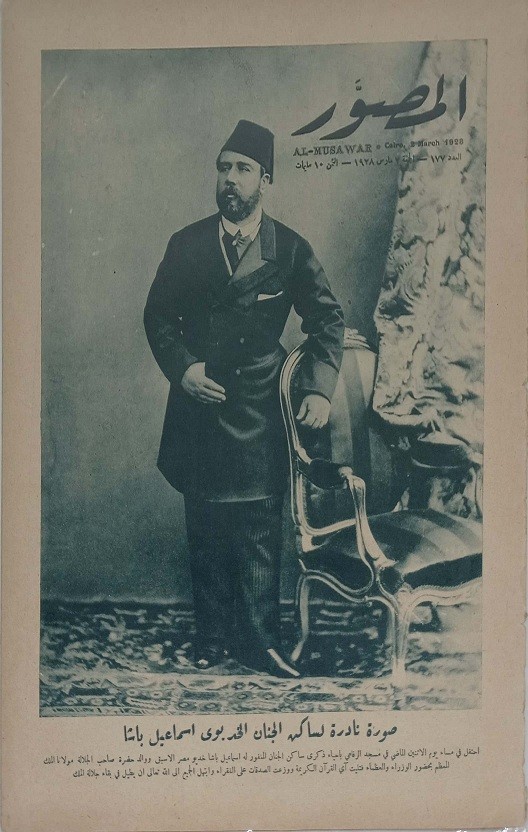Isma'il Pasha known as Ismail the Magnificent (31 December 1830 – 2 March 1895), was the Khedive of Egypt and Sudan from 1863 to 1879, when he was removed at the behest of the United Kingdom. Sharing the ambitious outlook of his grandfather, Muhammad Ali Pasha, he greatly modernized Egypt and Sudan during his reign, investing heavily in industrial and economic development, urbanisation, and the expansion of the country's boundaries in Africa.
His philosophy can be glimpsed at in a statement that he made in 1879: "My country is no longer in Africa; we are now part of Europe. It is therefore natural for us to abandon our former ways and to adopt a new system adapted to our social conditions".
In 1867 he also secured Ottoman and international recognition for his title of Khedive (Viceroy) in preference to Wāli (Governor) which was previously used by his predecessors in the Ottoman Eyalet of Egypt and Sudan (1517–1867). However, Isma'il's policies placed the Ottoman Khedivate of Egypt and Sudan (1867–1914) in severe debt, leading to the sale of the country's shares in the Suez Canal Company to the United Kingdom, and his ultimate toppling from power at British hands.
Family
FamilyThe second of the three sons of Ibrahim Pasha, and the grandson of Muhammad Ali, Ismail, of Albanian descent, was born in Cairo at Al Musafir Khana Palace. His mother was Circassian Hoshiar (Khushiyar Khater) third wife of his father. She was reportedly a sister of Valide Sultan Pertevniyal (1812–1883). Pertevniyal was a wife of Mahmud II of the Ottoman Empire and mother of Abdülaziz I
Youth and education
After receiving a European education in Paris where he attended the École d'état-major, he returned home, and on the death of his elder brother became heir to his uncle, Said I, the Wāli and Khedive of Egypt and Sudan. Said, who apparently conceived his own safety to lie in ridding himself as much as possible of the presence of his nephew, employed him in the next few years on missions abroad, notably to the Pope, the Emperor Napoleon III, and the Sultan of Ottoman Empire. In 1861 he was dispatched at the head of an army of 18,000 to quell an insurrection in Sudan, a mission which he successfully accomplished.
Khedive of Egypt
After the death of Said, Ismail was proclaimed Khedive on 19 January 1863, though the Ottoman Empire and the other Great Powers recognized him only as Wāli. Like all Egyptian and Sudanese rulers since his grandfather Muhammad Ali Pasha, he claimed the higher title of Khedive, which the Ottoman Porte had consistently refused to sanction. Finally, in 1867, Isma'il succeeded in persuading the Ottoman Sultan Abdülaziz to grant a firman finally recognizing him as Khedive in exchange for an increase in the tribute. Another firman changed the law of succession to direct descent from father to son rather than brother to brother, and a further decree in 1873 confirmed the virtual independence of the Khedivate of Egypt from the Porte.
Suez Canal
Ismail's khedivate is closely connected to the building of the Suez Canal. He agreed to, and oversaw, the Egyptian portion of its construction. On his accession, at the behest of Yacoub Cattaui his minister of Finance and close advisor, he refused to ratify the concessions to the Canal company made by Said, and the question was referred in 1864 to the arbitration of Napoleon III, who awarded £3,800,000 to the company as compensation for the losses they would incur by the changes which Ismail insisted upon in the original grant. Ismail then used every available means, by his own undoubted powers of fascination and by judicious expenditure, to bring his personality before the foreign sovereigns and public, and he had much success. In 1867 he visited Paris and London, where he was received by Queen Victoria and welcomed by the Lord Mayor. Whilst in Britain he also saw a British Royal Navy Fleet Review with the Ottoman Sultan. In 1869 he again paid a visit to Britain. When the Canal finally opened, Ismail held a festival of unprecedented scope, most of it financed by the Cattaui banking house, from whom he borrowed $1million, inviting dignitaries from around the world.





